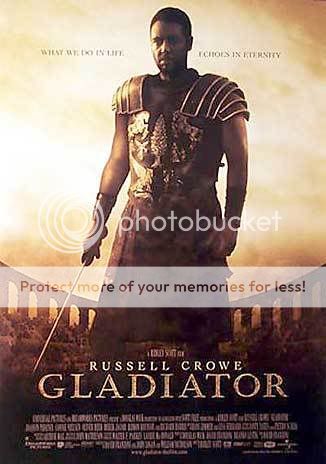
Gladiator is an excellent and well-made film that is Hollywood entertainment at its best and, along with Battlefield Earth, is a great way to start the year 2000 summer movie season!
The movie is quite daring in its own way: it is a spectacle set in Ancient Rome in 180 AD, a time when humans (being the inane creatures they are) more openly compensated for their inadequacies by watching other humans kill each other brutally. A time when tyrant emperors ruled and few would dare challenge them. The film is about one such person, Maximus (Russell Crowe), a General from Spain who fought and bled for Rome with much passion but is now a slave as a reward for his patriotism. This is a film that has been done several times and belongs to a kind, in my mind, that is fairly easy to do successfully. Everyone loves to watch the downtrodden good guy kick the smug and powerful bad guy's arse against all odds.
The story begins with an opening scene that reminded me of the one in Saving Private Ryan. As I mentioned before, I am desensitised to watching fictional violence (yet completely sensitive to any real-world account) and was bored with the initial scene in Saving Private Ryan. While I experienced the same boredom here to a degree, the reason Gladiator succeeds where the other movie fails is that it provides an ulterior motivation for the battle. In the first ten minutes, we see how Maximus holds himself, how the ruling Caesar, Marcus Aurelius (Richard Harris), views him, and how it illustrates the cowardice of Caesar's son, Commodus (Joaquin Phoenix). (Not to mention some amazingly violent and destructive scenes that puts the opening scene in Saving Private Ryan to shame, and all director Ridley Scott has at his disposal is "primitive" weaponry.) The Emperor is so pleased that he decides to crown Maximus the next Caesar. Commodus does not take this news kindly and orchestrates events such that in a short order, Maximus' wife and son are killed brutally and Maximus himself is broken and shackled as a slave. He is bought by Proximo (the late Oliver Reed who died about a year ago) and trained to fight as a gladiator.
Slowly, Maximus uses his warring skills to win the popularity of those who come to cheer for his death, until he gains an appearance in the Colosseum before Commodus who has made himself the new Caesar. Instead of having Maximus killed off right away, Commodus slowly lets him woo the crowd of Rome as well, until the final battle between them. In the end, Maximus triumphs against unsurmountable odds, aided in part by Commodus' sister Lucilla (Connie Nielsen) and the Roman Senator Gracchus (Derek Jacobi).
The set design and the cinematography are extravagant. The spectacles being staged, from the initial opening sequence to the gladiator fights, are grandiose. Scott, who gave us Alien and Blade Runner, has created a Rome that is to be marvelled at. The story itself is okay, but I had a hard time with most of the characters who simply seemed to be tacked on at the last minute to fill up an expansive set. There's nothing wrong with this (in fact, I almost prefer it given the black-and-white story line), but one should keep in mind that in Gladiator, the spectacle is more important the characters (which is ironic given how Maximus rises to fame).
The acting is generally very good, with Crowe doing an excellent job. A while ago, in my review Go, I was pondering the question of who would take over for the great action actors like Harrison Ford and Sean Connery. Crowe is definitely a strong contender. Connie Nielsen, Oliver Reed, and Richard Harris present solid performances. I was terribly unimpressed with Joaquin Phoenix's performance as a whiny Emperor.
Truth be told, Gladiator is not my kind of a film, the primary reason being that I didn't derive very much (pseudo) intellectual value from it (and I generally do in the dumbest of movies). I still recommend checking it out on the big screen, for the dazzling epic that it is.

ไม่มีความคิดเห็น:
แสดงความคิดเห็น